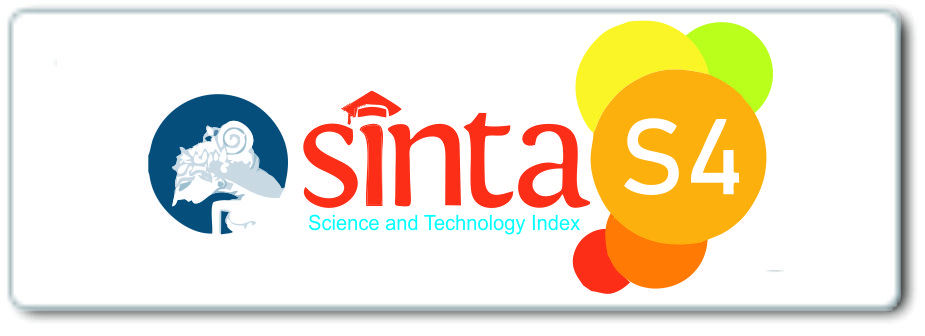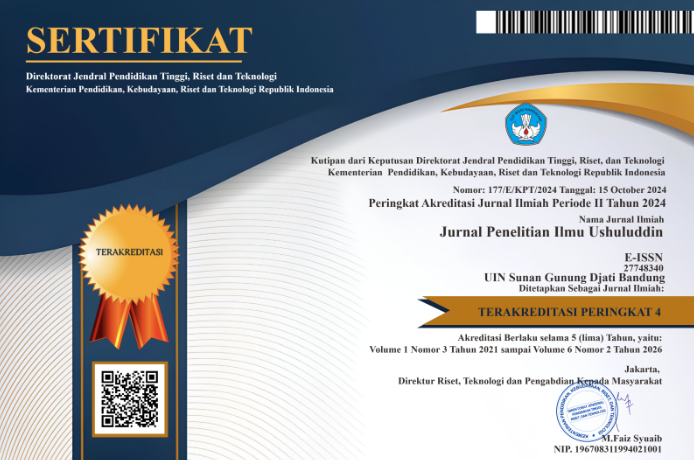Sikap Syukur sebagai Proses Pembentukan Budi Pekerti pada Remaja (Studi Deskriptif terhadap Siswa Kelas 10 di SMK Pasundan 4 Bandung)
DOI:
https://doi.org/10.15575/jpiu.17008Keywords:
Adolescents, Manners, SufismAbstract
This research aims to discuss what gratitude is and an attitude of gratitude in 10th grade students of SMK Pasundan 4 Bandung in the city of Bandung. The second is to find out what manner and behavior are for the 10th grade students of SMK Pasundan 4 Bandung in the city of Bandung. Third, to find out the role of gratitude in shaping character in adolescents. This study uses a qualitative research model and the source of the data used comes from the results of observations, interviews and various literatures related to the research theme. The results of this study indicate that character is a person's awareness of behaving according to the rules or norms that apply in society and gratitude is the acknowledgment of a servant to God for the blessings that have been given to him accompanied by the servant's submission to God. Most of the students of SMK Pasundan 4 Bandung in the city of Bandung who were the research subjects had a high level of gratitude as evidenced by the fulfillment of all the indicators of gratitude found in Sufism, also proving that almost all of the students who were the research subjects had noble manner and the last which shows a positive continuity between the attitude of gratitude in adolescents to the process of forming adolescent manners.
References
Abidin, M. Z., & Aulia, A. H. (2019). Pendidikan Karakter Menurut Islam dalam Perspektif Imam Al-Ghazali. Akademika: Jurnal Manajemen Pendidikan Islam, 1(1), 76-95.
al-Ghazaly, Abu Hamid. Ihya 'ulumuddin. Kairo: al-Ihya' al-Kutub al-Arabiyah.
Al-Haddad, Sayyid 'Abdullah. (2017). Tasawuf Kebahagiaan. Bandung: PT. Mizan Pustaka.
Al-jauziyah, Imam Ibnu Qayyim. (2018). Penjelasan Tuntas tentang Sabar & Syukur sebagai Jalan untuk Meraih Kebahagiaan Hidup. Jakarta: Darul Haq.
Badrudin. (2015). Pengantar Ilmu Tasawuf. Serang: A-Empat.
Dirgantara, Yuana Agus. (2012). Pelangi Bahasa Sastra dan Budaya. Garudhawaca Digital Book and POD.
Farida Nugrahani. (2014). Metode Penelitian Kualitatif dalam Penelitian Pendidikan Bahasa. Solo: Cakra Books.
Fatahillah, F., & Sari, S. W. (2021). Perspektif Orang Tua dalam Gerakan Penumbuhan Budi Pekerti pada Masa Pandemi Covid 19. Journal Of Elementary School Education (JOuESE), 1(1), 26-33.
Fathurahman, H. (2020). Hubungan Syukur dan Bahagia: Penelitian Deskriptif Terhadap Karyawan Industri Kulit Sukaregang (Doctoral dissertation, UIN Sunan Gunung Djati Bandung).
Hadiwinarto, H. (2014). Analisis Faktor Hasil Penilaian Budi Pekerti. Jurnal Psikologi UGM, 41(2), 229-240.
Hardisman. (2017). Tuntunan Akhlak Dalam Al-Quran dan Sunnah. Padang: Andalas University Press.
Hasanah, H. (2017). Teknik-teknik Observasi (Sebuah Alternatif Metode Pengumpulan Data Kualitatif Ilmu-Ilmu Sosial). At-Taqaddum, 8(1), 21-46.
Hipzu, H., Faisal, E. E., & Kurnisar, K. (2018). Analisis terhadap Implementasi Permendikbud Nomor 23 Tahun 2015 tentang Penumbuhan Budi Pekerti (Studi Kasus di Smp Negeri 1 Indralaya Utara) (Doctoral dissertation, Sriwijaya University).
Su’dadah, S. (1970). Pendidikan Budi Pekerti (Integrasi Nilai Moral Agama dengan Pendidikan Budi Pekerti). Jurnal Kependidikan IAIN Purwokerto, 2(1), 132-141.
Ibrahim. (2015). Metode Penelitian Kualitatif. Bandung: Alfabeta.
Isa, Abdul Qadir. (2017). Hakikat Tasawuf. Jakarta: Qisthi Press.
Kamba, Muhammad Nursamad. (2018). Kids Zaman Now. Tangerang Selatan: Penerbit Pustaka IIman.
Sendiang, M. (2019). Pemberdayaan Potensi Remaja Putus Sekolah di Kelurahan Ranotana Weru Manado Melalui Pelatihan Pengelolaan Sistem Informasi Kelurahan. Warta Pengabdian, 12(4), 351-357.
Solihin, M. (2003). Tasawuf Tematik. Bandung: CV. Pustaka Setia.
Masyhuri, A. (2018). Konsep Syukur (Gratefulnes)(Kajian Empiris Makna Syukur bagi Guru Pon-Pes Daarunnahdhah Thawalib Bangkinang Seberang, Kampar, Riau). AL-MANAR: Jurnal Komunikasi dan Pendidikan Islam, 7(2), 1-22.
Nst, K. (2017). Konsep Keutamaan Akhlak Versi Al-Ghazali. Hijri, 6(1).
Nurinawati, Umi. (2008). Metode Penelitian Kualitatif dan Kuantitatif: Teori dan Aplikasi. Bandung: Agung Media.
Pelu, M., Dardiri, A., & Zuchdi, D. (2015). Pendidikan Budi Pekerti Di Sekolah. Jurnal Pembangunan Pendidikan: Fondasi dan Aplikasi, 3(2), 198-212.
Rahman, M. H. (2019). Metode Mendidik Akhlak Anak dalam Perspektif Imam Al-Ghazali. Equalita: Jurnal Studi Gender dan Anak, 1(2), 30-49.
Rahmawati, R. (2020). Nilai-Nilai Humanistik dalam Living Qur’an di MIN 1 Sleman. Elementary: Islamic Teacher Journal, 8(1), 83-96.
Saebani, Beni Ahmad., & Hamid, Abdul. (2017). Ilmu Akhlak. Bandung: Pustaka Setia.
Santika, I. W. E. (2020). Pendidikan Karakter pada Pembelajaran Daring. Indonesian Values and Character Education Journal, 3(1), 8-19.
Sarwono, W. Sarlito. (2012). Psikologi Remaja. Jakarta: Rajawali Pers.
Fatimah, S., Zuriah, N., & Syahri, M. (2016). Implementasi Pendidikan Budi Pekerti dalam Menanggulangi Kenakalan Siswa. Jurnal Civic Hukum, 1(1), 18-32.
Sugiyono. (2018). Metode Penelitian Pendidikan. Bandung: Alfabeta.
Sunusi, Syamsul. (2016). Hubungan Pendidikan Karakter Dengan Budi Pekerti Siswa di SMP Negeri 2 Galesong Kabupaten Takalar. Seminar Nasional.
Husna, Aura. (2013). Kaya dengan Bersyukur: Menemukan Makna Sejati Bahagia dan Sejahtera dengan Mensyukuri Nikmat Allah. Jakarta: PT. Gramedia Pustaka Utama.
Wibawa, L., & Haryanto, H. (2015). Pelatihan Penanaman Budi Pekerti pada Remaja dengan Pendekatan Pendidikan Berbasis Keluarga. Teknodika, 13(1).
Yakub, Ismail. (n.d.). Ihya' Al-Ghazali. In I. al-Ghazali, Terjemahan Ihya 'ulumuddin. Jakarta Selatan: CV. Faizan.
Yani, Ahmad. (2007). Be Excellent: Menjadi Pribadi Terpuji. Jakarta: Al Qalam.
Yulianti, C. (2018). Makna Syukur dan Ciri-cirinya dalam Tafsir Al-Munir: Analisis terhadap Tafsir Al-Munir Karya Wahbah Zuhaili (Doctoral dissertation, UIN Sunan Gunung Djati Bandung).
Downloads
Published
Issue
Section
License
Authors who publish in Jurnal Penelitian Ilmu Ushuluddin agree to the following terms:
- Authors retain copyright and grant the journal right of first publication with the work simultaneously licensed under an Attribution-ShareAlike 4.0 International (CC BY-SA 4.0) License that allows others to share the work with an acknowledgment of the work's authorship and initial publication in this journal.
- Authors are able to enter into separate, additional contractual arrangements for the non-exclusive distribution of the journal's published version of the work (e.g., post it to an institutional repository or publish it in a book), with an acknowledgment of its initial publication in this journal.
- Authors are permitted and encouraged to post their work online (e.g., in institutional repositories or on their website) prior to and during the submission process, as it can lead to productive exchanges, as well as earlier and greater citation of published work (See The Effect of Open Access).












